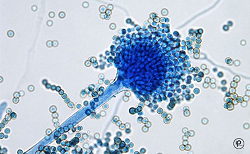Description:
Cryptococcus, like many fungi, produces spores that are found in the air that we breathe. These spores will be inhaled into our lungs but they do not cause any harm because of our immune defences. However, they can cause life-threatening infections in individuals that have a weakened immune system, for example those that have AIDS or have had an organ transplant.
So, we’re interested in immune cells called macrophages which are needed for immune defence against Cryptococcus.
It is impossible to see how immune cells destroy this fungus during infection because we do not have see-through bodies. So, in order to study this we are using zebrafish. Zebrafish have a similar immune system like our own but are transparent which makes it possible to see how infections happen. Using zebrafish we are testing new ways to enhance immune defences against Cryptococcus.
Ultimately these investigations may lead to development of novel therapies towards Cryptococcal infections.
Alfred Kamuyango works in Professor Simon Johnston’s lab at the University of Sheffield.
Medical and Patient education videos
-
Title
Description
-

Dr. Rohini Manuel, Consultant Clinical Microbiologist, Public Health England, London
-

Shila Seaton, Bacteriology Scheme Manager, UK NEQAS for Microbiology, Public Health England
-

Dr. P. Lewis White, Principal Clinical Scientist, Public Health Wales Microbiology, Cardiff
-

Prof. Dr. Clemens Decristoforo, Radiopharmacist, Univ.Klinik f.Nuklearmedizin, Innsbruck, Austria
-

Dr. Martin Hoenigl, Infectious Diseases and Tropical Medicine, Medical University of Graz, Austria
-

Dr. Jonathan Lambourne, Consultant in Infectious Diseases, Barts Health NHS Trust, London
-

Dr. Inês Ushiro-Lumb, Lead Clinical Microbiologist for Organ Donation and Transplantation, NHS Blood and Transplant, London
-

Dr. Mike Bromley, Lecturer, Institute of Inflammation and Repair, University of Manchester
-

Dr. Sharleen Braham, Clinical Scientist, King’s College Hospital, London
-

Dr. Duncan Wilson, Research Fellow, Aberdeen Fungal Group, University of Aberdeen
